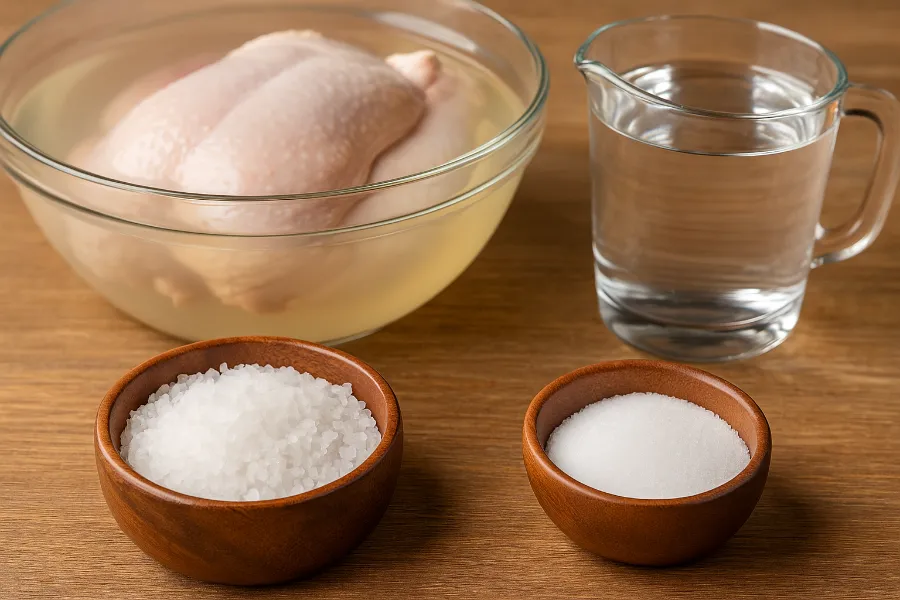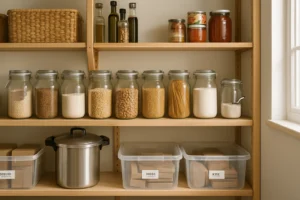If there’s one kitchen ritual I never skip, it’s brining my chickenand I always use kosher salt. After years of trial and error, I discovered the secret to perfectly seasoned, juicy chicken every time: a kosher salt chicken brine.
It’s simple, affordable, and transforms ordinary chicken into something restaurant-worthy. Whether you’re roasting, grilling, or frying, brining is the easiest way to get that tender, flavorful bite every time.
Why Kosher Salt Is the Best for Brining

When people ask why I’m so loyal to kosher salt, I tell them this: it just behaves better.
Kosher salt’s coarse, flake-like crystals dissolve evenly and cling beautifully to meat. Unlike table salt, it’s clean and pure—no additives, no iodine, and no metallic taste. That’s why professional chefs and home cooks rely on it for brining.
Advantages
- Consistent salting: Large flakes are easy to measure and control, reducing the risk of over-salting.
- Clean flavor: Free from additives that can alter taste or appearance.
- Better texture: The slow-dissolving crystals let flavor penetrate deeply.
- Reliable performance: Works perfectly in both cold and warm water.
Disadvantages
- Morton and Diamond Crystal kosher salts differ in density—Morton is denser and saltier by volume. Always measure by weight.
- The larger flakes take up more storage space.
- It’s not ideal for baking, where precision is crucial.
Even with a few drawbacks, kosher salt remains the top choice for brining chicken thanks to its purity, balance, and predictability.
How to Brine Chicken
Brining might sound complicated, but it’s actually one of the simplest and most forgiving cooking techniques. Here’s how I do it step by step.
- Dissolve the salt.
In a large bowl or pot, mix kosher salt with cold water until completely dissolved. - Add aromatics.
I like adding crushed garlic, a few peppercorns, a bay leaf, and a spoonful of sugar. For roasted chicken, lemon zest or thyme is excellent. - Submerge the chicken.
Place the chicken in a non-reactive container and make sure it’s fully covered by the brine. - Refrigerate.
Let the chicken sit while the salt does its work. The time depends on the cut (see below). - Rinse and dry.
Rinse under cold water, pat dry, and if possible, air-dry in the fridge for crispier skin.
That’s all it takes—just patience and saltwater science.
Chicken Brine Ratio
Getting the ratio right is everything. Too much salt and it’s ruined; too little and nothing happens.
The golden rule: 6 percent salt to water by weight.
That equals about 60 grams (¼ cup Diamond Crystal kosher salt) per liter of water or 40 grams (3 tablespoons Morton kosher salt) per liter.
Add 25–30 grams of sugar per liter if you like a touch of sweetness and better browning.
Always measure by weight when possible—different salts have different densities.

Chicken Brine for Roasting
A good brine makes all the difference in roast chicken. It keeps the breast meat juicy and the skin crisp.
My Favorite Roasting Brine
- 1 gallon water
- ½ cup kosher salt
- ¼ cup sugar
- 4 smashed garlic cloves
- 2 sprigs thyme or rosemary
- 1 teaspoon peppercorns
- Lemon slices
Brine for 8–12 hours, then rinse and pat dry. Let the chicken rest uncovered in the fridge for 3–4 hours to dry the skin. Roast at 425°F until golden and cooked through. The flavor and texture will impress anyone at your table.
Chicken Brine for Grilling
Grilled chicken can dry out fast, but brining with kosher salt locks in moisture even over high heat.
My Go-To Grilling Brine
- 1 gallon water
- ½ cup kosher salt
- 3 tablespoons brown sugar
- 1 teaspoon garlic powder
- 1 teaspoon smoked paprika
- Optional: 1 tablespoon soy sauce or apple cider vinegar
Soak smaller cuts like thighs or drumsticks for 3–4 hours, or breasts for 1–2 hours.
Rinse, pat dry, and brush lightly with oil before grilling. Cook on medium heat to prevent sugar from burning.
You’ll get smoky, tender chicken with deep, balanced flavor.
Chicken Brine for Frying
For perfect fried chicken, brining is non-negotiable. It seasons the meat through and ensures it stays juicy under the crunchy crust.
Step 1 – Kosher Salt Brine
- 1 quart cold water
- ¼ cup kosher salt
- 2 tablespoons sugar
- 2 garlic cloves, smashed
Brine 2–3 hours, then rinse and pat dry.
Step 2 – Buttermilk Soak
Transfer the brined chicken to seasoned buttermilk and refrigerate overnight.
This double process creates tender meat with an irresistibly crisp coating once fried at 350°F.
How Long to Brine Chicken
Brining times vary depending on the cut. Too short and it’s ineffective; too long and it becomes overly salty or soft.
| Chicken Type | Ideal Time | Maximum Time |
|---|---|---|
| Whole chicken | 8–12 hours | 24 hours |
| Bone-in thighs or drumsticks | 3–6 hours | 8 hours |
| Boneless breasts | 30–90 minutes | 3 hours |
| Wings | 1–2 hours | 4 hours |
Stick within these ranges for the best texture and flavor.
Salt to Water Ratio for Brine
For smaller batches or quick reference:
- 1 quart (4 cups) water = 3 tablespoons Diamond Crystal kosher salt
- or 1 quart water = 2 tablespoons Morton kosher salt
Add 1–2 tablespoons sugar if you want extra browning.
This ratio produces a balanced, flavorful brine without overpowering the chicken.
Simple Chicken Brine Recipe
For a quick, fuss-free brine, try this:
Ingredients
- 1 quart water
- 3 tablespoons kosher salt
- 2 tablespoons sugar
- 2 garlic cloves, smashed
- ½ teaspoon peppercorns
Directions
- Dissolve salt and sugar in the water.
- Add the aromatics.
- Submerge the chicken for 1–2 hours.
- Rinse, dry, and cook.
Ideal for weeknight dinners when you need tender chicken without much prep time.
Easy Chicken Brine Recipe
If you’ve never brined before, this version is nearly impossible to mess up.
Ingredients
- 1 gallon cold water
- ½ cup kosher salt
- ¼ cup sugar
- 4 garlic cloves
- 3 sprigs rosemary or thyme
Method
- Stir to dissolve the salt and sugar.
- Add the aromatics.
- Submerge the chicken completely.
- Chill for 2–8 hours, depending on size.
- Rinse and dry before cooking.
It’s simple, reliable, and guarantees flavorful, juicy meat every time.
The Science Behind a Kosher Salt Chicken Brine

Brining works because of a few key chemical reactions that happen inside the meat:
- Osmosis: Salt draws out a bit of moisture, which then mixes with dissolved flavor molecules and re-enters the meat.
- Protein denaturation: Salt gently unwinds muscle fibers, helping them retain more moisture during cooking.
- Moisture retention: The loosened fibers hold water even under high heat, keeping the chicken juicy.
That’s the science behind the magic: salt, time, and balance.
Kosher Salt vs Other Salts
After years of cooking, I’ve tested them all. Here’s the truth:
Table Salt:
Fine-grained and compact, it’s easy to overdo. Additives can create bitterness.
Sea Salt:
Great as a finishing salt but inconsistent for brines due to varied crystal sizes.
Kosher Salt:
Pure, consistent, dissolves evenly, and gives you total control.
It’s the professional standard for brining because results are predictable and clean.
When precision matters, kosher salt wins every time.
Common Brining Mistakes to Avoid
Brining is simple, but small missteps can ruin your efforts. Avoid these:
- Using table salt without adjusting the measurement.
- Forgetting to chill the brine before adding chicken.
- Over-brining or leaving the chicken too long.
- Skipping the drying step before cooking.
- Reusing brine after it has touched raw poultry.
Once you’ve practiced a few times, you’ll instinctively know how long and how strong to brine for the results you love.
Final Thoughts on Kosher Salt Chicken Brine
Brining is one of those small kitchen habits that deliver huge rewards. A kosher salt chicken brine turns ordinary chicken into something extraordinary—juicy inside, crisp outside, and perfectly seasoned through to the bone.
Whether you’re preparing a weeknight roast, grilling outdoors, or frying up a family favorite, taking a few minutes to mix salt, water, and a few aromatics changes everything.
I keep a box of kosher salt on my counter for that reason alone. It’s not just an ingredient; it’s the difference between dry chicken and a dish everyone remembers. Once you experience it, you’ll never cook chicken any other way.
FAQs
Kosher salt has large, pure flakes that dissolve evenly and give you precise control over saltiness. It seasons the meat deeply without leaving a harsh or metallic taste.
Use about ¼ cup Diamond Crystal or 3 tablespoons Morton kosher salt per quart of water. This keeps your brine balanced and prevents the chicken from becoming too salty.
Brine a whole chicken for 8–12 hours in the refrigerator, but never longer than 24 hours. This timing allows for full seasoning while keeping the meat’s texture tender.
No, never reuse brine that has touched raw poultry. It can harbor bacteria and make the next batch unsafe to eat.
Yes, rinse under cold water to remove excess surface salt, then pat dry thoroughly. Drying also helps achieve crispy, golden skin when roasting or grilling.
You can, but the measurement will change because the crystal sizes differ. Kosher salt is preferred for its clean flavor and consistent results.
Sugar balances the salt and helps chicken brown evenly during cooking. It gives the skin a gentle caramelized flavor and color.













